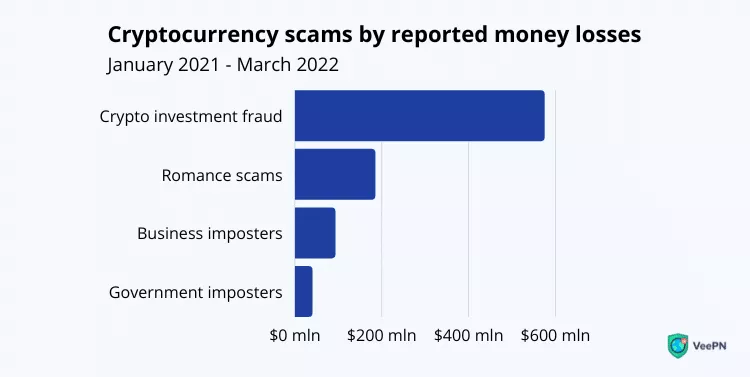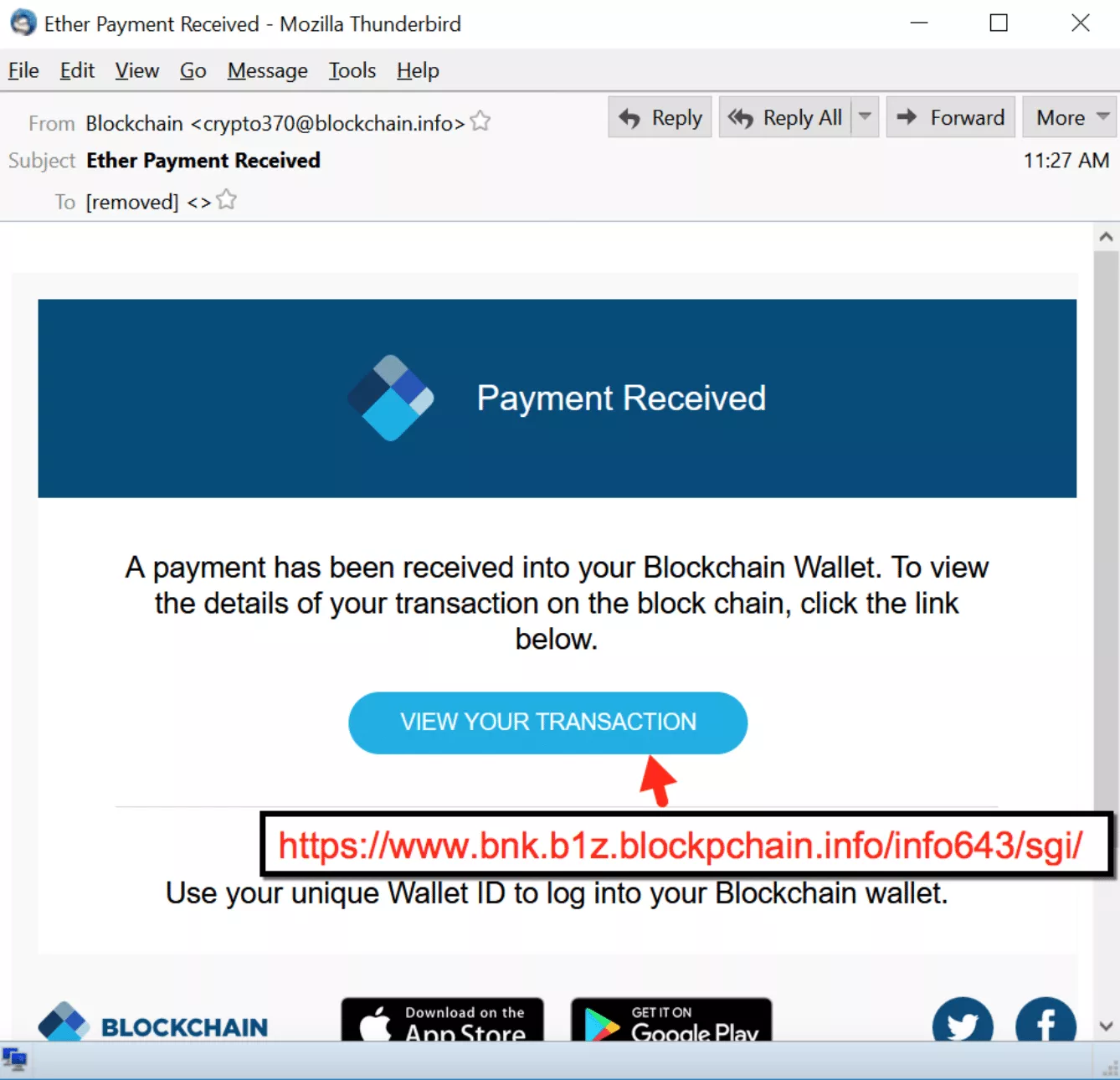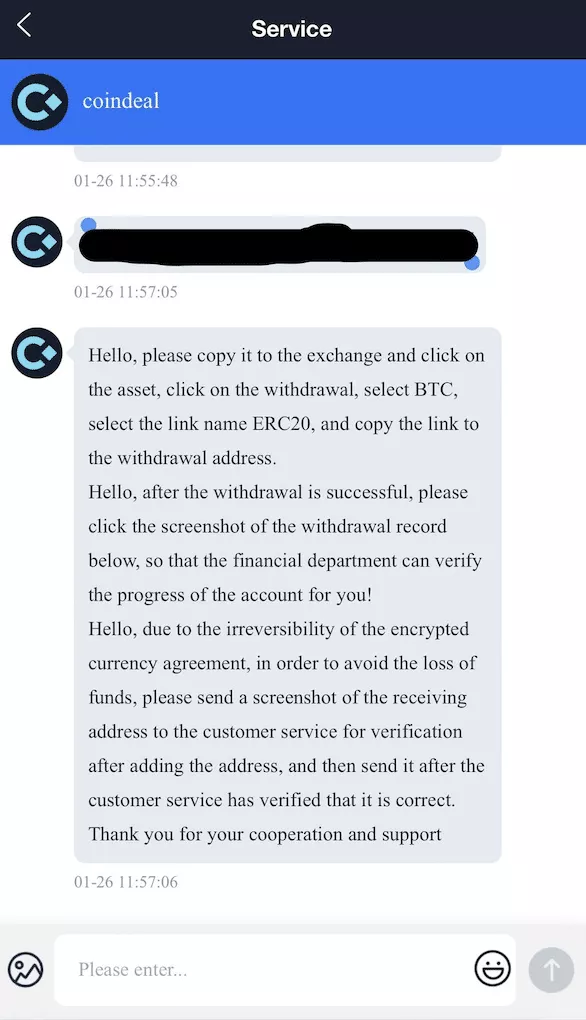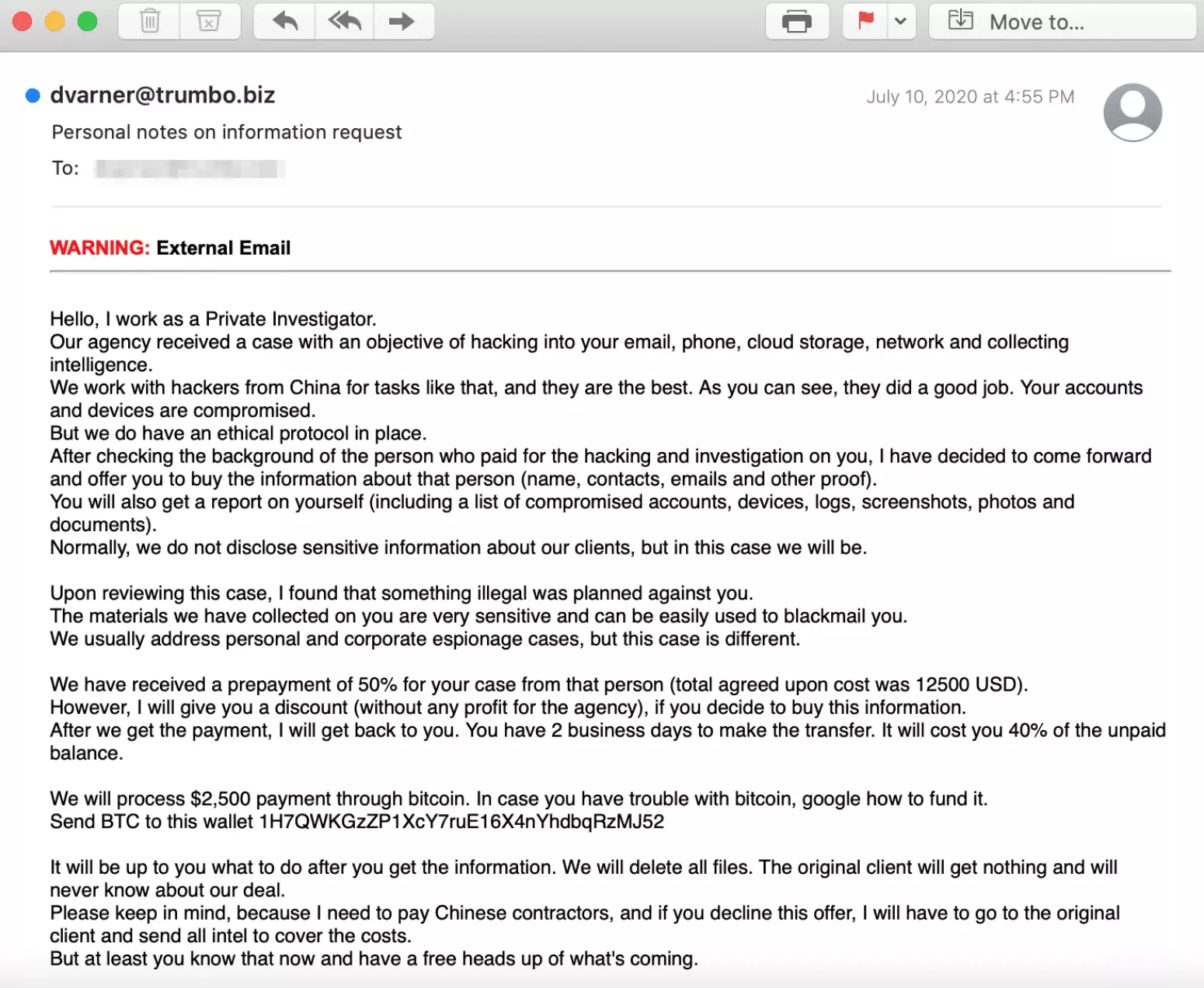How to Avoid Bitcoin Scams: 7 Types, Examples, and Tips
The price of Bitcoin is well known to drop and rise. In 2021, it reached an all-time high price of almost $67 thousand, and then plunged to under $30 thousand in 2022. However, despite this yo-yo effect, the BTC continues to be the most stable and popular digital token in the crypto world. And unfortunately, traders and investors are not the only ones monitoring the BTC price.
Scammers, hackers, and other malicious actors come up with all new ways of compromising the security of users and getting access to their crypto wallets. Want to keep your money safe and stay safe from fraud? Keep on reading in this article, you will learn some of the frequent scams involving Bitcoin and what you can do to avoid them.

What is a Bitcoin scam?
A Bitcoin scam is a malicious activity or fraudulent activity with an intent to compromise your private information and steal your crypto money. Scammers employ many different methods and tactics in order to lure people into revealing their credentials or making an investment into fake exchanges. And while cryptocurrencies are becoming mainstream among millions of the world’s population, scammers are taking advantage of this rising popularity for their own profit.
Need proof? Here you go. In the first quarter of 2022, cryptocurrency fraud losses on crypto assets were nearly $330 million. For comparison, the total loss was $130 million in 2020 and $680 million in 2021. Moreover, 70% of those scams targeted Bitcoin. And there is no surprise. Statista reports that Bitcoin still dominates the world of crypto, with a market cap of over 40%.

Furthermore, of the thousands of real life examples of Bitcoin fraud, some of them were genuinely humongous. For example, in 2018, the Bitconnect project shut down after robbing more than 4.5 thousand individuals $2.4 billion through a so-called Ponzi scheme that promised them more money with no real business behind it. And this is just one of the hundreds of similar cases.
Now, let’s see how the Bitcoin scams are different and what are the techniques used by malicious actors to get your cybersecurity compromised?
How do Bitcoin scams work?
There are two most common kinds of cryptocurrency scams:
- A scammer tries to make you give him your personal information such as digital wallet credentials, private keys, security codes, etc. This way, they will have access to your wallet, and they will steal your crypto.
- Impersonation or fake investment offers strive to persuade traders and businesses to send cryptocurrency like Bitcoin directly to scammers.
In both cases, malicious actors use common scam techniques trying to confuse, tempt, or deceive you. However, those approaches are becoming even more sophisticated when it comes to Bitcoin. The thing is that scammers use the focus on privacy and the decentralized nature of crypto to compromise traders’ wallets and steal their funds.
As a result, if you’re trading or storing Bitcoin, you may face various types of scam, from fake investments and bogus exchanges to phishing emails and non-existent giveaways. Let’s look at the most typical ones in more detail.
The most common Bitcoin cryptocurrency scams
As mentioned above, there are multiple techniques a scammer may apply to compromise your crypto wallet keys or encourage you to store your BTC in an unreliable wallet. According to the statistics, the most widespread type of Bitcoin fraud is related to crypto investments, followed by romance scams and imposters. Here is the latest data based on fraud reports to the FTC’s Consumer Sentinel Network. It shows crypto losses due to scams in January 2021 – March 2022.

Now, let’s reveal the most common Bitcoin scams and learn how to avoid them.
1. Bitcoin phishing scams
Phishing attempts are some of the most common scams that crypto has. Normally, these are emails that are sent to trick the users by the malicious actors and to make them reveal the confidential information. Phishing scams will often masquerade as popular crypto-related services, such as Binance and Coinbase. Such fake alerts present themselves in an urgent manner and demand users to click on a link provided immediately. However, if doing so you will get redirected to one of fake crypto sites, where hackers can steal your crypto wallet credentials.
The example below is an email that may look legitimate at first glance. It tells you that you’ve received a cryptocurrency payment to your Blockchain wallet. Moreover, it kindly provides a link to view the “transaction.” But if curiosity makes you want to check what’s going on, you will fall for a phishing hook.

How to avoid it?
- Do not click on any links
- Check the sender’s address
- Type the legitimate website address in your browser
- Report a potential scam to Federal Trade Commission (FTC)
2. Fake Bitcoin investment fraud
The FTC report we’ve mentioned above claims fake crypto investment to be the most widespread type of scam. Usually, these are too-good-to-be-true offers that guarantee high returns for low risk if you put your money into initial coin offerings (ICO). But most likely, it’s a malicious scheme aiming to steal your Bitcoin and close the project without any returns at all, even if it tries to look like one of the regulated funds or exchange traded funds you might see in traditional finance.
Unfortunately, it’s quite challenging to tell a fake ICO from a real one. As a result, many investors take this risk and fall victim to massive scams. In this case, the most significant red flag to watch out for is guaranteed returns. In the world of crypto, such offers do not bode well.
In the example below, a fake cloud mining service offers crypto enthusiasts to make a BTC deposit and promises 0.16% of the hourly profit. In fact, this is an illegal business using a Ponzi scheme to trick users.

How to avoid it?
- Do not trust unverified ICOs
- Stay away from too-good-to-be-true offers
- Don’t buy into promises of high returns
- Check crypto-related services before investing your funds, do your own research, and see whether regulators like the securities and exchange commission have issued any warnings.
3. Romance crypto scams
Did you know that on dating websites like Tinder, you may meet not love the love of your life, but a dangerous crypto scammer? Yes, that’s right, romance fraud is the second most common cryptocurrency related malicious technique. And here’s how it works.
Imagine you’ve met someone on a dating site. After several weeks of active communication, your new friend offers you to make a cryptocurrency investment and make good money. Oh, you know nothing about it? No worries! They will help you out and explain everything you need to do. But at some point, the invested funds will be moved to a malicious exchange, leaving you unable to withdraw a single penny.
Here is an example message sent to a romance scam victim.

How to avoid it?
- Do not accept suspicious crypto investment offers
- Store your money only in well-protected digital wallets
- Avoid crypto exchange scams
4. Bitcoin giveaway scams
Elon Musk is giving ten thousand BTC and wants to share with anyone interested? No, it’s not a generous giveaway, but a scam you may face on social media like Twitter, YouTube, and Instagram. Once you click on the link and confirm that you want to participate, they will ask you to make a verification payment. And, when you send your Bitcoin to the provided Blockchain address, you will be left with nothing.

How to avoid it?
- Do not participate in suspicious Bitcoin giveaways
- Do not click on any links provided in crypto giveaway posts
- Report a potential scam to Twitter, YouTube, or Google SafeBrowsing.
5. Man-in-the-middle (MITM) attacks
Although man-in-the-middle (MITM) isn’t an actual scam, it’s a widespread cyber attack you should be aware of. In the crypto context, hackers perform MITM attacks to steal the credentials and private keys of traders using a public WiFi network. Here’s how this scheme works.
A malicious actor can intercept the traffic between your device and an unprotected hotspot when you are in a hotel, restaurant or airport. And once you make a transaction through your crypto wallet or make a Bitcoin transaction, that cryptocurrency transaction data will be compromised without your knowledge.
How to avoid it?
- Try not to make Bitcoin transactions when using public WiFi
- Encrypt your traffic with a virtual private network (VPN)
6. Crypto imposter schemes
Remember a fake Elon Musk and his “generous Bitcoin giveaway?” Well that’s just the tip of the iceberg. Scammers will often utilize impersonation and imposter schemes, posing as celebrities, influencers, government personnel, or recognized experts. For example, an impersonator can pretend to represent a credible crypto exchange. They try to persuade people to invest in “profitable” projects and then vanish with the stolen funds.
Here’s an example of a common imposter scam. A person who pretends to be a high-ranking officer of a promising crypto-related company encourages a potential fraud victim to invest in a project to get “a license.”

How to avoid it?
- Do not respond to suspicious messages
- Do not open any provided links
- Report the scam to Federal Trade Commission (FTC)
7. “I know your password” scams
Blackmailing and extortion are the most brutal and, sadly, pretty common Bitcoin scams. This type of fraud usually involves an email where a sender claims to know your password or other confidential information. Then, they threaten a victim to disclose this data or transfer it into the hands of some mysterious “client.” Of course, they also promise not to do that if you send them a certain amount of crypto. Here’s an example of such an email.

To make the threat more convincing, fraudsters may even use some of your old passwords they’ve probably purchased on the dark web. All these tricks aim to make you worried and force you to act immediately.
How to avoid it?
- Do not respond to the message
- Do not send any money to the provided crypto wallet
- Report the scam to the FBI IC3 or eCustomer center.
How to identify a crypto scam
No matter how advanced a BTC scam is, you can always find a way to spot cryptocurrency scams. Here are several red flags to watch out for if you want to keep yourself away from crypto-related tricks.
Writing mistakes and typos
Spelling and grammar errors in emails, postings and direct messages may be considered minor. However the devil lies in the details. In fact, mistakes in writing are one of the main signs that someone is trying to scam you. So read the notification carefully before making the decision as to how to act.
Too-good-to-be-true offers
Tempting deals, generous awards, and unsolicited investment opportunities that sound like “free money” offers are most likely fake. In particular, you should never share your personal information in exchange for such proposals, no matter how honest they’re trying to seem.
Fake celebrity testimonials
Celebrity approval and fake testimonials are other common ways Bitcoin scammers use to trick people into investing their crypto funds. Do not trust influencers who might appear to be just as deceptive as their offers.
Also, make sure to pay attention to the reviews presented on a potentially malicious website. Take a look at the example below. A notorious movie producer Harvey Weinstein suddenly became Henry Alamin, a “crypto investor,” providing an “honest review.”

Manipulations and threats
Many crypto scammers try to blackmail users. For instance, they may threaten to reveal your private data and demand ransom. However, such threats are mostly feeble and often sent by Internet trolls and fraudsters trying to play on people’s feelings. So the best thing you can do here is report a scam.
Unreasonable demands
Phishing emails and scam messages often involve a sense of urgency. However, instead of clicking on the provided link or sharing any requested data immediately, check who’s the sender. Moreover, even if you know this person, a random message asking for your help (most likely, by sending a certain amount of BTC) is likely a scam.
How to protect yourself against Bitcoin scams?
Not to fall victim to Bitcoin fraud or mining scam, you can defend yourself by adhering to the following security best practices. Let’s take a closer look at the most effective ones.
Your digital wallet is the place where you can store your Bitcoin and other crypto funds. You should do your best to make it well-protected and carefully encrypted. For that, you can opt for either a cold (offline) or a hot (online) wallet.

Store crypto in a cold wallet
Your digital wallet is the place where you can store your Bitcoin and other crypto funds. You should do your best to make it well-protected and carefully encrypted. For that, you can opt for either a cold (offline) or a hot (online) wallet.
Cold wallets are normally more secure since they are placed on real hardware, not online. Meanwhile, hot wallets are more vulnerable to hacker attacks. This option is suitable for active crypto traders making many transactions. However, it’s worth keeping most of your crypto funds in a cold wallet.
Create strong passwords
Reusing a password may significantly compromise your wallet’s security. If hackers get access to one of your accounts, they can get access to others hassle-free, including your bank account. Here are several tips on protecting your crypto funds with a good password.
- Make sure your password consists of at least eight characters
- Do not link your passwords to any personal information
- Use unique passwords for every account
- Use a password manager tool to keep your wallet keys safe
Use trustworthy cryptocurrency exchanges, not fake websites
Many crypto exchanges aren’t real. These fake Bitcoin sites strive to steal users’ private information and transfer it to hackers. So it’s crucial to pick a credible crypto exchange platform with a good reputation among users and financial institutions. Some of the most well-known examples are Coinbase, Binance, Crypto.com, and Kraken.
Before buying Bitcoin on the chosen crypto exchange platform, make sure it offers multiple powerful security features, including the following ones.
- Multi-factor authentication
- Insurance against data breaches
- Reliable offline storage for crypto funds
- Well-protected withdrawal
- Strong encryption
Avoid suspicious links and popups
Phishing emails and text message scams often encourage users to click on malicious links. They are trying to make you feel worried and confused by creating a sense of urgency. But don’t be hasty. Here is what you should do to protect yourself from getting into a phishing net.
- Verify the legitimacy of the sender’s email address
- Check if a potentially malicious website uses the HTTPS security protocol
- Avoid suspicious crypto-related ads and popups
- Type URLs manually instead of clicking on the provided links
Use VPN
A virtual private network (VPN) is a powerful tool that ensures online privacy and, at the same time, helps you stay secure when surfing the web. In particular, it’s worth adopting a VPN tool to safeguard your Bitcoin transactions and avoid various scams.
Thanks to reliable AES-256 encryption and multiple security features, a VPN will keep you away from phishing attempts, malicious links, and dangerous websites. On top of that, a virtual private network can protect you from many other cyber threats, such as MITM attacks, DDoS attacks, BTC miner scams, and crypto hijacking.
Secure your Bitcoin transactions with VeePN
Looking for a powerful security solution to keep your bitcoins safe? Consider VeePN! It’s a premium VPN service providing a wide range of features that will help you defend yourself from crypto-related threats. In particular, NetGuard will allow you to avoid Bitcoin scams, phishing attacks, malicious links, and potentially infected popups. VeePN enables you to choose one of the proposed pricing plans that suits your needs best and take advantage of a 100% money-back guarantee.
FAQ: Bitcoin Scams
- Store crypto in a cold (offline) wallet
- Create strong passwords
- Use credible cryptocurrency exchanges
- Avoid suspicious links and popups
- Use a virtual private network (VPN)
- Spelling and grammar mistakes is a message
- Free money offers and high return guarantees
- Manipulations and threats
- Sense of urgency
Some of the most common crypto scams and cyber attacks are crypto phishing, Bitcoin mining scams, fake Bitcoin investment scams, romance scams, imposter schemes, and man-in-the-middle attacks. Read this article to learn more about these and other cryptocurrency threats.
VeePN is freedom
Download VeePN Client for All Platforms
Enjoy a smooth VPN experience anywhere, anytime. No matter the device you have — phone or laptop, tablet or router — VeePN’s next-gen data protection and ultra-fast speeds will cover all of them.
Download for PC Download for Mac IOS and Android App
IOS and Android App
Want secure browsing while reading this?
See the difference for yourself - Try VeePN PRO for 3-days for $1, no risk, no pressure.
Start My $1 TrialThen VeePN PRO 1-year plan








